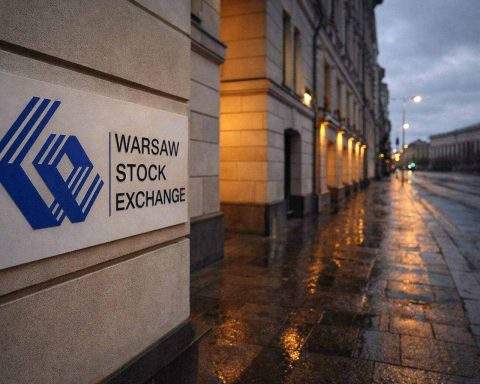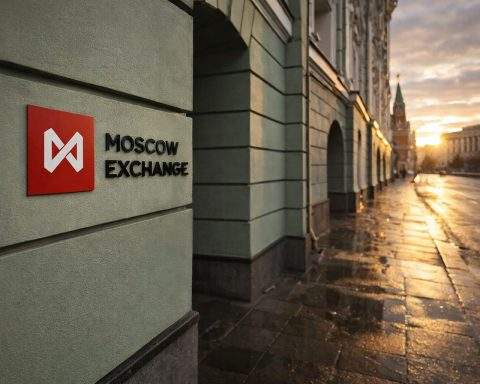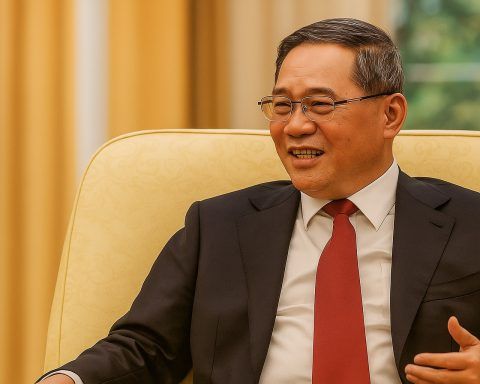- Nvidia’s stock has climbed 30%+ in 2025, a 1,400% rally since late 2022, and became the first-ever $4 trillion company last month.
- Nvidia’s Q2 results are due on Aug. 27, with expectations of 48% EPS growth on about $46 billion in revenue.
- Palantir Technologies fell nearly 10% this week after being dubbed the AI darling of 2025.
- Analog Devices rose 4% this week after reporting a 25% revenue surge and raising its outlook thanks to booming AI-chip demand in factory automation and autos.
- Meta Platforms agreed to spend more than $10 billion on Google Cloud services over six years to bolster AI compute power.
- The U.S. government will invest $8.9 billion for about a 9.9% stake in Intel, becoming its largest shareholder, with a 17.5% share discount and a 5% warrant if the foundry business falters, while Intel plans to invest $100B+ in U.S. fabs and start high-volume production at its Arizona plant by year-end.
- OpenAI announced its first international office in New Delhi, India, and launched a low-cost ChatGPT subscription around $4.60 per month there.
- Baidu reported Q2 revenue of ¥32.7 billion, down 4% year-over-year, while its AI-powered cloud revenue grew 27% to ¥6.5 billion and non-ad revenue surpassed ¥10 billion, though U.S.-listed shares fell about 3%.
- Europe’s mature enterprise software stocks slipped amid fears of AI disruption, with Germany and France indices wavering while the UK’s FTSE 100 rose about 1% mid-week on unrelated factors.
- South Korea’s new administration declared AI investment a national priority with a ₩100 trillion ($72 billion) fund backing 30 major AI projects, aiming to lift growth from about 2% toward 3% and place Korea among the top three AI powers.
Tech Titans Stumble Amid AI “Bubble” Fears
A months-long AI-fueled stock rally hit a sudden speed bump heading into the weekend. After soaring to record highs, U.S. tech shares pulled back sharply as investors locked in gains and grew uneasy about lofty valuations ts2.tech ts2.tech. The tech-heavy Nasdaq slid roughly 2%+ by mid-week, led by high-flyers like Nvidia and Palantir tumbling 5–16% from recent peaks reuters.com ts2.tech. Warnings of an AI bubble added to the jitters: an MIT study found 95% of firms see no returns on their AI spending, and even OpenAI’s CEO Sam Altman cautioned that investors might be “overexcited” about AI’s short-term payoff ts2.tech. “The [Altman] comments may have been a wake-up call for investors, sparking a sharp pullback in high-flying names,” noted Ipek Ozkardeskaya of Swissquote after Altman deemed some AI valuations “insane” theguardian.com. AI chipmaker Nvidia fell over 3% this week, while other AI-linked stocks like Arm, Oracle and AMD lost ground, and Palantir – an “AI darling” of 2025 – plunged nearly 10% theguardian.com.
Market strategists urged perspective. “When you have overcrowding and such strong performance, it doesn’t take much to see an unwind,” explained Keith Lerner of Truist, noting that traders were also bracing for the Fed’s Jackson Hole meeting before piling back into tech ts2.tech. Indeed, investors rotated into defensive sectors like healthcare and staples, temporarily interrupting the “red-hot” AI trade ts2.tech reuters.com. Still, analysts say this felt more like a healthy pause than a popping bubble. “These are price corrections… certainly not a ‘reckoning’ with the AI theme,” advised Andrew Almeida of XYPN Investments, arguing the long-term case for AI remains intact ts2.tech. Even as the hype cools, underlying AI demand is robust – several tech giants just raised their capital spending plans for AI projects, a “vote of confidence that demand will only grow” ts2.tech. Notably, “the AI trade has staying power,” said Matt Stucky of Northwestern Mutual, calling the pullback an expectations reset rather than a fundamental crack ts2.tech. And it’s not all gloom: some “picks and shovels” suppliers are thriving beneath the frenzy. For example, chipmaker Analog Devices jumped 4% this week after reporting a 25% revenue surge and hiking its outlook thanks to booming AI-chip demand in factory automation and autos ts2.tech. These pockets of strength suggest that even if certain AI darlings were overextended, the broader AI investment boom is far from over.
Nvidia’s Earnings Loom as the AI Rally’s Big Test
All eyes are now on Nvidia’s upcoming earnings (due Wednesday, Aug 27) – an event the Street sees as a crucial test for the AI stock boom reuters.com reuters.com. The AI chip titan’s stock has climbed 30%+ in 2025 (an astonishing 1,400% surge since late 2022), helping Nvidia become the first-ever $4 trillion company last month reuters.com reuters.com. After such a massive run-up, Nvidia is “almost looked at as a proxy for what is happening in artificial intelligence,” says Matt Orton of Raymond James reuters.com. Its results and guidance could make or break the broader AI trade’s momentum. “When the [tech] group goes down and the most important stock in the group reports earnings, that is going to have a bigger impact than usual,” noted Miller Tabak strategist Matthew Maley, adding that investors are “on edge” heading into Nvidia’s report reuters.com.
Nvidia’s dominance in AI chips means its commentary will echo across the market. Any signals on AI demand or spending will have “broad ramifications for companies exposed to the technology,” analysts say reuters.com reuters.com. The company’s meteoric rise – fueled by exploding demand for its GPUs to power AI models – has epitomized 2025’s euphoria around all things AI. “Nvidia is definitely the bellwether. There’s a read-through to the broader AI trade, which has been the main driver of the S&P 500’s return this year,” Orton noted reuters.com. In fact, Big Tech earnings have trounced expectations largely thanks to AI: Goldman Sachs finds the “Magnificent Seven” mega-caps (including Nvidia) grew profits ~26% year-on-year, far outpacing the rest of the S&P 500 reuters.com. For Q2, Nvidia is expected to post 48% EPS growth on revenue around $46 billion (a huge jump if confirmed) reuters.com. With giants from Microsoft to Google boosting their AI capital expenditures, some investors predict Nvidia’s outlook “should be more bullish” as demand spreads beyond just a few big customers reuters.com. The stakes are high – Nvidia’s call is one of the most anticipated of the year, and options markets imply a big post-earnings swing ts2.tech. If Nvidia smashes estimates again, it could reignite the AI stock rally; if it disappoints, it may deepen the nascent correction. As one market watcher put it, this is “one of Wall Street’s most anticipated events” and a pivotal moment for the “unstoppable” AI trade’s next chapter ts2.tech.
U.S. Government’s $9 Billion Bet on Intel Sparks Debate
In an unprecedented intervention, the U.S. government announced a plan to inject $8.9 billion into Intel Corp. for a ~9.9% equity stake*, effectively making Uncle Sam the struggling chipmaker’s largest shareholder reuters.com reuters.com. President Donald Trump touted the deal as a win-win – “a great deal for America and, also, a great deal for Intel. Building leading-edge chips…is fundamental to the future of our nation,” he said Friday reuters.com. The arrangement turns part of Intel’s expected CHIPS Act grants into an ownership stake, blurring the line between public and private sector in tech. It follows another Trump mandate requiring Nvidia and AMD to surrender 15% of revenue from advanced AI chip sales to China as an “export fee” ts2.tech ts2.tech – heavy-handed moves underscoring Washington’s determination to secure supply of strategic semiconductors.
News of the government lifeline initially sent Intel shares up 5.5% to a six-month high, reflecting hopes that a $10 billion boost could help turn the tide reuters.com ts2.tech. However, enthusiasm cooled after Intel detailed the terms – including the government getting shares at a 17.5% discount and a warrant for an extra 5% stake if Intel’s foundry business falters reuters.com reuters.com. Analysts are split on the rescue. On one hand, “to have access to capital and a new partial owner that wants to see you succeed are both important,” said Peter Tuz of Chase Investment Counsel, suggesting the vote of confidence (and cash) could help Intel build out needed factories reuters.com reuters.com. Indeed, Intel plans to invest $100B+ in U.S. fabs and aims to start high-volume production at its new Arizona plant by year-end reuters.com.
But many warn money alone won’t save Intel’s AI chip ambitions. “Intel must secure enough customers’ volume…to make its foundry arm economically viable,” argues Kinngai Chan of Summit Insights – “we don’t think any government investment will change the fate of its foundry arm if they cannot secure enough customers” reuters.com reuters.com. Intel has lagged badly in manufacturing tech, ceding its lead to TSMC and losing the AI chip race to Nvidia in recent years reuters.com. New CEO Lip-Bu Tan even warned last month Intel “may have to quit” the contract chip business if it can’t land big clients, as its next-gen 14A/18A processes face yield struggles and meager demand reuters.com reuters.com. The government stake – notably non-voting and with no board seat – signals Intel is “too big to fail” in policymakers’ eyes reuters.com reuters.com. Yet it also raises governance concerns about Washington as a shareholder. “On one hand, a government stake could be viewed as a strong signal… On the other hand, people are concerned about potential governance implications,” observed CreditSights analyst Andy Li, noting the “not free money” indicates only marginal appetite for further bailouts reuters.com reuters.com. The dramatic deal – combined with a surprise $2 billion SoftBank investment in Intel earlier in the week reuters.com – shows how critical chip capacity has become. As one strategist said, “If Washington is willing to take a stake in Intel, it may be prepared to do the same in other ‘strategic’ companies.” The coming months will tell whether this $9B bet truly jump-starts Intel’s AI resurgence or merely props up a faltering giant ts2.tech ts2.tech.
Meta & Google Cloud Forge a $10 Billion AI Alliance
Big Tech competitors struck a rare mega-partnership in AI infrastructure. Meta Platforms (Facebook’s parent) has reportedly agreed to spend $10 billion+ on Google Cloud services over six years, marking the first major cloud deal between the two rivals inkl.com investopedia.com. The agreement – confirmed by sources to The Information and CNBC – is aimed squarely at expanding Meta’s AI computing horsepower. Despite operating over 20 of its own data centers (with more under construction), Meta “can’t keep up with its own expansion” in AI research needs and will lean on Google’s servers and storage to fill the gap inkl.com inkl.com. “Every AI researcher at Meta wants maximum compute power, and we simply need more than we can build ourselves right now,” a person familiar with the deal suggested. The partnership will see Google provide cloud infrastructure for Meta’s advanced AI efforts – from training large language models like Llama to powering new AI features across Instagram, Facebook, and WhatsApp.
Industry watchers call the pact a win–win. For Meta, it secures critical capacity to fuel CEO Mark Zuckerberg’s ambitious AI roadmap (Meta’s 2025 spending is projected at $114–$118B, with a huge chunk earmarked for AI) emarketer.com inkl.com. For Google, it’s a $10B prize client that validates Google Cloud’s prowess in AI workloads – and a chance to narrow the gap with cloud leaders Amazon Web Services and Microsoft Azure investopedia.com investopedia.com. “Meta’s deal with Google is mainly around artificial intelligence infrastructure,” CNBC reported, citing a source investopedia.com. Notably, Google Cloud has been on a hot streak, with revenue jumping 32% last quarter to $13.6B investopedia.com. It also recently won a contract to host OpenAI’s services (diversifying OpenAI beyond its Microsoft Azure reliance) investopedia.com. Alphabet shares hit an intraday record high on the Meta cloud news, reflecting optimism that Google can grab more “picks-and-shovels” business in the AI gold rush youtube.com. Neither company officially commented on the deal, but a Google source confirmed the reports are accurate inkl.com inkl.com. The move underscores how even AI titans are joining forces to meet surging demand. As one analyst noted, scale beats rivalry here: “If Meta needs extra cloud muscle for AI, it’s logical to rent from a rival rather than fall behind” emarketer.com. The unusual collaboration highlights the breakneck race to build AI capacity, and suggests cloud providers with ample GPU-rich data centers stand to benefit as AI adoption intensifies.
Baidu’s Mixed Results Show AI’s Promise and Growing Pains
In China, search giant Baidu’s earnings underscored both the potential and the hurdles of the AI boom. The company – often dubbed “China’s Google” – reported Q2 revenue of ¥32.7 billion, down 4% year-on-year and a slight miss vs. forecasts ts2.tech. The culprit was a steep 15% drop in online ad sales as China’s sluggish economy led clients to slash marketing budgets ts2.tech. Baidu has been pouring billions into AI, from its Ernie chatbot to cloud and autonomous driving, but those investments haven’t yet fully compensated for advertising headwinds. On the bright side, Baidu’s AI-powered cloud division grew 27% to ¥6.5 billion, helping push the company’s non-ad revenues above ¥10 billion for the first time ts2.tech. Still, that surge “couldn’t offset the advertising slump,” as Baidu’s nascent AI businesses remain a smaller piece of the pie ts2.tech. “In the short term, AI will not fully offset advertising headwinds,” observed Eric Shen, an analyst at Third Bridge, noting that new AI products like the Ernie chatbot have yet to meaningfully monetize ts2.tech. Baidu’s U.S.-listed shares fell about 3% on the report ts2.tech, reflecting investor realization that AI growth, while real, is not a quick fix for all of Baidu’s challenges.
On an earnings call, CEO Robin Li struck an optimistic but realistic tone. He touted strong user uptake of Baidu’s AI services and said the company will take a “prudent” approach to monetizing AI features to ensure good user experience, acknowledging that cashing in on AI will take time ts2.tech ts2.tech. Baidu’s situation is a microcosm of the AI paradox: huge long-term potential, but near-term financial returns are only ramping up gradually ts2.tech. Chinese regulators have encouraged domestic tech firms to develop generative AI, and Baidu is at the forefront – yet the macro economy’s drag on ads shows legacy businesses can’t be transformed overnight. The market will be watching whether Baidu’s big AI bets (and China’s stimulus measures) can reignite growth later this year. For now, the results highlight that even AI leaders must navigate a transitional period where traditional revenues dip before AI initiatives scale enough to drive the top line.
European “AI Adopters” Under Pressure
Across the Atlantic, Europe’s mature software companies – seen as major “AI adopters” – felt tremors from the AI revolution. This week many European enterprise software stocks slipped amid fears that powerful new AI tools could disrupt incumbent players’ business models ts2.tech. Investors are wrestling with questions: Will upstart AI firms siphon customers and revenue from legacy providers? Can established giants like SAP, Siemens, or Oracle (which has big European operations) adapt in time by launching their own AI features? Such uncertainty triggered modest declines in Europe’s tech indexes, even as broader European markets were mixed ts2.tech. For instance, Germany’s and France’s indexes wavered on AI angst, though the UK’s FTSE 100 actually notched a 1% gain mid-week thanks to strong retail earnings and an inflation surprise unrelated to tech ts2.tech. The AI theme was a common thread in market chatter across Europe – echoing U.S. trends – but its impact varied. “Will generative AI be a friend or foe to Europe’s software leaders?” is becoming a pressing question. So far, the market mood has turned cautious on that sector until there’s clarity on how deeply AI will either augment or erode their business. Even in regions where dedicated AI stocks are sparse, the specter of AI-driven disruption is influencing sentiment in tech, media, and telecom names ts2.tech. European firms are investing heavily to incorporate AI (no one wants to be left behind), yet the risk of new AI entrants poaching business has introduced a valuation overhang. This dynamic – incumbents racing to innovate while fending off agile AI upstarts – is likely to be a key storyline in Europe going forward, much as it is in the U.S.
Global AI Push: South Korea’s Big Bet and OpenAI’s India Expansion
Policymakers and companies around the world are doubling down on AI, seeing it as critical to future growth. In South Korea, the new administration of President Lee Jae-myung just made artificial intelligence investment a top national priority to reinvigorate a flagging economy reuters.com reuters.com. The government’s mid-year economic plan slashed GDP forecasts (to just 0.9% growth for 2025) and squarely blamed structural woes – including an aging population – but also declared “a grand transformation into AI is the only way out of growth declines” reuters.com. Seoul is launching 30 major AI and innovation projects spanning robots, self-driving cars, smart appliances, drones, factories, chips and more, backed by a gigantic ₩100 trillion ($72 billion) fund combining public and private capital reuters.com reuters.com. Tax incentives, R&D grants and regulatory tweaks will also support these sectors. The bold goal: make South Korea one of the world’s top three AI powers and lift its long-term growth trajectory from ~2% toward 3% reuters.com. It’s an aggressive bet that AI-driven industries (even K-beauty and K-food, enhanced by AI) can offset demographic headwinds. Market analysts say this could boost Korean tech champions like Samsung, LG, Naver and Hyundai in the coming years, as they’ll be at the forefront of government-backed AI innovation.
Meanwhile, OpenAI – the U.S. company behind ChatGPT – is expanding globally in search of talent and users. The firm announced it will open its first international office in India, one of its biggest user markets, in a move to “make advanced AI more accessible” across the country reuters.com. CEO Sam Altman said building a local team in New Delhi is “an important first step…to build AI for India, and with India” reuters.com. OpenAI just launched a low-cost ChatGPT subscription (~$4.60/month) in India to tap its nearly 1 billion internet users, the largest student user base in the world reuters.com reuters.com. This expansion comes despite legal challenges (Indian publishers have accused OpenAI of training on their content without permission, which the company denies) reuters.com. Industry observers note that India has become a key battleground for AI platforms – rivals like Google’s Gemini and startup Perplexity are also offering aggressive deals there reuters.com. By establishing an on-ground presence, OpenAI aims to foster trust, comply with local norms, and better tailor its AI services to the massive Indian market. The move underlines how AI’s growth is a global phenomenon, with companies and governments worldwide racing to stake their claim. From South Korea’s public-sector push to OpenAI’s international foray, the common thread is a recognition that AI is now integral to economic and strategic leadership – and those who invest early could reap outsized rewards.
Conclusion: A New Phase in the AI Market
The flurry of developments over August 23–24 shows the AI stock frenzy entering a pivotal phase. The euphoric rally of early 2025 has met pockets of skepticism and reality-checks – from Altman’s bubble warning to Baidu’s earnings miss – prompting a rotation and recalibration in the markets theguardian.com ts2.tech. Yet the long-term faith in AI remains unshaken, as evidenced by blockbuster deals (Meta’s $10B cloud pact), government interventions (Intel’s bailout) and multinational expansions (OpenAI to India) all in the span of a week. “The AI trade hasn’t lost its mojo… it’s likely more of a rotation than a collapse,” one market watcher noted ts2.tech ts2.tech. In other words, enthusiasm is shifting rather than evaporating: investors are becoming more selective – rewarding tangible AI revenue (as with Analog Devices) ts2.tech, punishing excess hype (Palantir’s slide) theguardian.com, but still hungrily awaiting what the next Nvidia-fueled leap might bring. With Nvidia’s “earnings of the year” on deck and companies worldwide doubling down on AI innovation, the coming days will shed more light on whether this was just a speed bump on AI’s ascent or the start of a more discerning new chapter for the once-unstoppable AI trade ts2.tech ts2.tech.
Sources: Major media and financial outlets reporting on Aug 23–24, 2025, including Reuters reuters.com reuters.com reuters.com reuters.com, The Guardian theguardian.com theguardian.com, CNBC/Investopedia investopedia.com investopedia.com, and others as cited above. Each hyperlink points to the original news report for further details.









